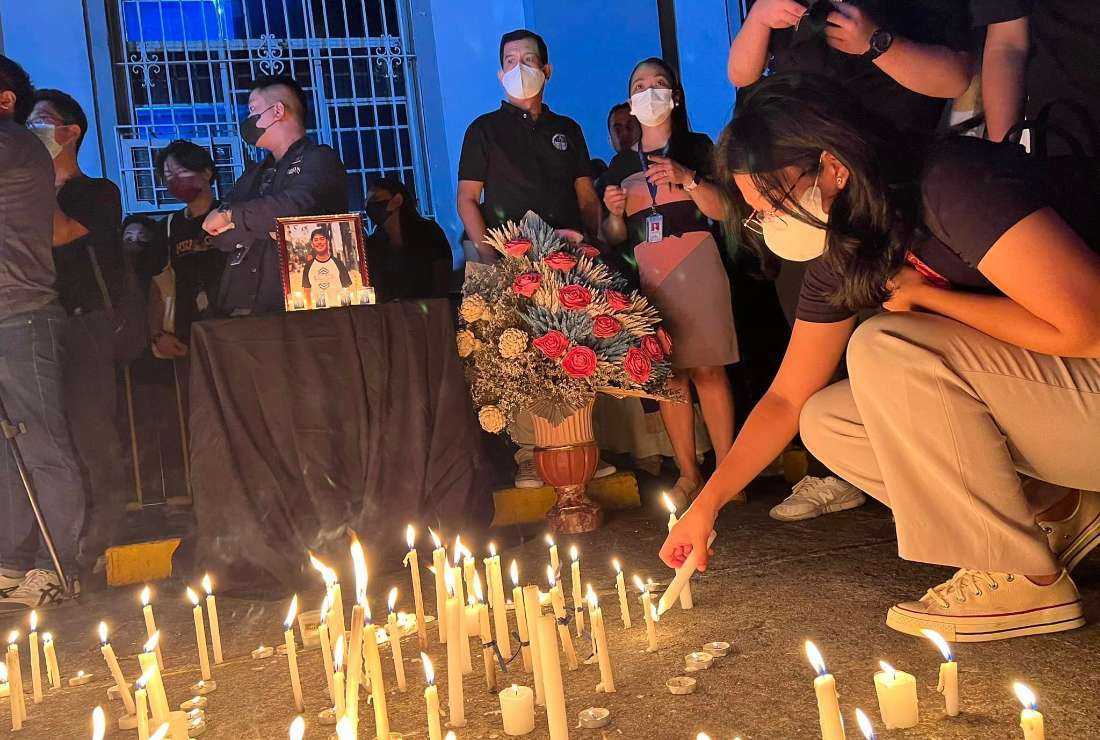
Hundreds stage protest after student at Vincentian-run university is found dead after attending hazing rite

Students from Adamson University attend a prayer vigil on March 1 following the death of a freshman. (Photo: Adamson University)
Hundreds of students in the Philippines staged a protest on March 1 calling for a ban on fraternities in universities and colleges after a Catholic university freshman was found dead earlier in the day after going missing on Feb. 18.
The students from the southern part of the country's most populated island, Luzon, blamed the death of John Matthew Salilig, 24, on a hazing ritual they said was probably carried out by a fraternity at the Vincentian-run Adamson University in the capital Manila.
“As long as fraternities are allowed in schools and colleges, hazing, this senseless violence to be accepted as a ‘brother,’ will continue. Fraternities need not be regulated. They need to be banned on campus,” one protester, Joshua Villamor, told UCA News.
He was one of the hundreds of students who skipped classes at Villanueva Institute of Technology and Somascan-run Aemilianum College in the Bicol region after hearing of the death.
Villamor said hazing posed a threat not only to a student’s safety but also to their dreams.
“When one joins a fraternity, one leg is already in the grave,” 21-year-old Villamor said.
Salilig went missing after he went to attend an initiation rite of a fraternity known as Tau Gamma Phi, according to police.
His body was found near a house where the alleged hazing occurred in Cavite province, just south of Manila.
University professors also joined the march, calling on the Commission on Higher Education to impose stricter rules and penalties on universities that accredit fraternities on campus.
“We need penalties not only for those who are guilty of hazing but for schools and university officials who recognize these groups on campus. They have to be accountable for this violence,” Villanueva Institute assistant professor, Laren Deuda, 35, told UCA News.
Deuda said college administrators “have a responsibility to parents that their students are in a safe place.”
In 2018, the Philippines amended a 1995 anti-hazing law that penalizes not only those who participate in hazing but also the alumni who give consent to such initiation rites.
Despite the law, hazing has been an accepted practice among fraternities in universities and colleges, according to Nicky Joy Camanso, a lawyer and educator, who wrote a dissertation on the subject in 2018.
Scores of deaths have been recorded in the Philippines since 1954 when the first hazing victim was reported.
Over the last two years, at least six deaths were reported by the Philippine media
In this latest case, Adamson University said it has conducted an internal probe and was cooperating with the authorities.
The university also tried to reassure students that the campus was a safe place.
“Adamson University has always been a familiar space for all of its students, teachers, alumni, friends and visitors. This is your safe place… We will ensure it will remain that way,” it said in a statement.
It is not yet clear whether Catholic schools and universities would be willing to ban fraternities altogether.
Help us keep UCA News independent
The Church in Asia needs objective and independent journalism to speak the truth about the Church and the state.
With a network of professionally qualified journalists and editors across Asia, UCA News is just about meeting that need. But professionalism does not come cheap. We depend on you, our readers, to help maintain our independence and seek that truth.
A small donation of US$2 a month would make a big difference in our quest to achieve our goal.

Share your comments